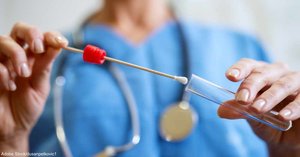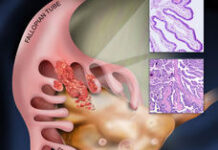Maureen Boesen has always known breast and ovarian cancer ran in her family and that she was at risk as well. Many of the women in her family have been lost to one of the two diseases.“We’re able to really track our history of breast cancer back to the late 1800s and early 1900s,” Maureen says. “My grandmother actually passed away from ovarian cancer when she was 44. She had five sisters and none of them lived to the age of 50. Then, my mother was diagnosed with breast cancer when she was 32. We knew there was something going on and that it was a very young age.”Because of the high prevalence of breast and ovarian cancer in Maureen’s family, she and her two sisters partook in a study when they were young girls, while their mother, coincidentally, was going through chemotherapy for stage II breast cancer.“We were all tested in the same exact room,” Maureen’s sister, Bridget Stillwell, says. “I can even remember what the room looked like.”As part of the study, all three girls were given DNA tests, but because they were so young and not at risk yet, it was decided that they wouldn’t get their results until they were older. When the girls, who were ages 3, 5, and 7 at the time, were all adults, they got their BRCA gene results, which showed that one of Maureen’s sisters had a dangerous BRCA gene mutation, while the other did not. Then Maureen went in for her results and learned she had a BRCA mutation as well.
 Photo: Adobe Stock/science photo“It was a lengthy conversation, which made me very uncomfortable, because why would a conversation that wasn’t going to change my life last that long?” she remembers. “It was just devastating, because I knew what breast cancer and ovarian cancer can do to a family. You know, my first question out of my mouth was, ‘Is there any chance this could be wrong?’ The researcher said ‘No.’”Maureen came out of the meeting determined to let the information empower her rather than make her helpless. She scheduled a bilateral prophylactic mastectomy to remove her breast tissue to minimize her cancer risk when she was just 23 years old and planned to have a full hysterectomy when she was done having children to protect herself against ovarian cancer as well.“This was me doing what I was supposed to do, and this was me being empowered and me being proactive and not waiting until I have a cancer diagnosis,” says Maureen.
Photo: Adobe Stock/science photo“It was a lengthy conversation, which made me very uncomfortable, because why would a conversation that wasn’t going to change my life last that long?” she remembers. “It was just devastating, because I knew what breast cancer and ovarian cancer can do to a family. You know, my first question out of my mouth was, ‘Is there any chance this could be wrong?’ The researcher said ‘No.’”Maureen came out of the meeting determined to let the information empower her rather than make her helpless. She scheduled a bilateral prophylactic mastectomy to remove her breast tissue to minimize her cancer risk when she was just 23 years old and planned to have a full hysterectomy when she was done having children to protect herself against ovarian cancer as well.“This was me doing what I was supposed to do, and this was me being empowered and me being proactive and not waiting until I have a cancer diagnosis,” says Maureen.
 Photo: Adobe Stock/resketOver the years, she recalls feeling a twinge of sadness here and there for her lost breasts, particularly when she got married and was not able to breastfeed any of her three children. But all in all, she still believed she was doing the right thing for herself and her family.“I didn’t get to breastfeed them. It was sad,” says Maureen. “I’m not broken-hearted or devastated about it, but it is sad to think I couldn’t provide for my children like that.”And Maureen believed she was doing the right thing again when she decided to move forward with her full hysterectomy. “The right thing to do and what the doctors say to do is have a complete hysterectomy by the age of 35 and I was in my early 30s,” she says.Before she could have the procedure done, her doctor and her insurance company wanted her to do another DNA test. Maureen already knew the BRCA mutation results would be positive, but she consented to the test anyway. She got the shock of her life, however, when her doctor called her to announce the test had come back negative.
Photo: Adobe Stock/resketOver the years, she recalls feeling a twinge of sadness here and there for her lost breasts, particularly when she got married and was not able to breastfeed any of her three children. But all in all, she still believed she was doing the right thing for herself and her family.“I didn’t get to breastfeed them. It was sad,” says Maureen. “I’m not broken-hearted or devastated about it, but it is sad to think I couldn’t provide for my children like that.”And Maureen believed she was doing the right thing again when she decided to move forward with her full hysterectomy. “The right thing to do and what the doctors say to do is have a complete hysterectomy by the age of 35 and I was in my early 30s,” she says.Before she could have the procedure done, her doctor and her insurance company wanted her to do another DNA test. Maureen already knew the BRCA mutation results would be positive, but she consented to the test anyway. She got the shock of her life, however, when her doctor called her to announce the test had come back negative.
 Photo: Adobe Stock/dusanpetkovic1“I was angry. I was regretful. I was happy. I was sad. I so desperately wanted to feel relief, ‘Oh, thank God, this is the best day of my life,’ but it wasn’t. It was just devastating,” says Maureen.A second test confirmed the first set of results, and Maureen again found herself awash in emotion, both good and bad. She’d been saved just in time from an unnecessary hysterectomy, but she had also lost her breasts and gone her whole life believing she was at a high risk of BRCA-related cancer, all because of one bad test.Dr. Jennifer Klemp, Director of Cancer Survivorship and a cancer risk counselor at the University of Kansas Cancer Center, says she’s not surprised Maureen was originally told she had a BRCA gene mutation and an increased risk of breast cancer. At the time she was tested, and even at the time she was given her results, less was known about the way BRCA gene mutations affect the human body.
Photo: Adobe Stock/dusanpetkovic1“I was angry. I was regretful. I was happy. I was sad. I so desperately wanted to feel relief, ‘Oh, thank God, this is the best day of my life,’ but it wasn’t. It was just devastating,” says Maureen.A second test confirmed the first set of results, and Maureen again found herself awash in emotion, both good and bad. She’d been saved just in time from an unnecessary hysterectomy, but she had also lost her breasts and gone her whole life believing she was at a high risk of BRCA-related cancer, all because of one bad test.Dr. Jennifer Klemp, Director of Cancer Survivorship and a cancer risk counselor at the University of Kansas Cancer Center, says she’s not surprised Maureen was originally told she had a BRCA gene mutation and an increased risk of breast cancer. At the time she was tested, and even at the time she was given her results, less was known about the way BRCA gene mutations affect the human body.
 Photo: Adobe Stock/nobeastsofierce“Twenty years ago, when we sent our first tests and BRCA 1 and 2 were the two genes we tested for, about 30-40 percent of the time we would get something called a ‘variant of uncertain significance,’” Dr. Klemp says. “Basically that meant we found a mutation or an error in the DNA, but we didn’t know if that was associated with an increased risk of cancer. Today, using a reputable lab, that should be less than 1-2 percent.”Because things are changing so quickly in the field of breast cancer research, Klemp suggests that anyone who has been tested for BRCA gene mutations more than five years ago should have the test redone. She also warns against using at-home DNA tests to learn about your BRCA genes; instead, talk to your doctor and use a certified reputable lab to get a commercial test.The university that gave Maureen her initial false positive offered to re-test her. She hopes the result of this fourth test will be negative as well, enabling her to move on with her life with less worry. For now, she and her sisters are writing a book, called “Nipples Optional,” about their experience. Share on Facebook
Photo: Adobe Stock/nobeastsofierce“Twenty years ago, when we sent our first tests and BRCA 1 and 2 were the two genes we tested for, about 30-40 percent of the time we would get something called a ‘variant of uncertain significance,’” Dr. Klemp says. “Basically that meant we found a mutation or an error in the DNA, but we didn’t know if that was associated with an increased risk of cancer. Today, using a reputable lab, that should be less than 1-2 percent.”Because things are changing so quickly in the field of breast cancer research, Klemp suggests that anyone who has been tested for BRCA gene mutations more than five years ago should have the test redone. She also warns against using at-home DNA tests to learn about your BRCA genes; instead, talk to your doctor and use a certified reputable lab to get a commercial test.The university that gave Maureen her initial false positive offered to re-test her. She hopes the result of this fourth test will be negative as well, enabling her to move on with her life with less worry. For now, she and her sisters are writing a book, called “Nipples Optional,” about their experience. Share on Facebook
Source
Home World News Woman Has Unnecessary Double Mastectomy and Narrowly Avoids Hysterectomy After Bad BRCA...









